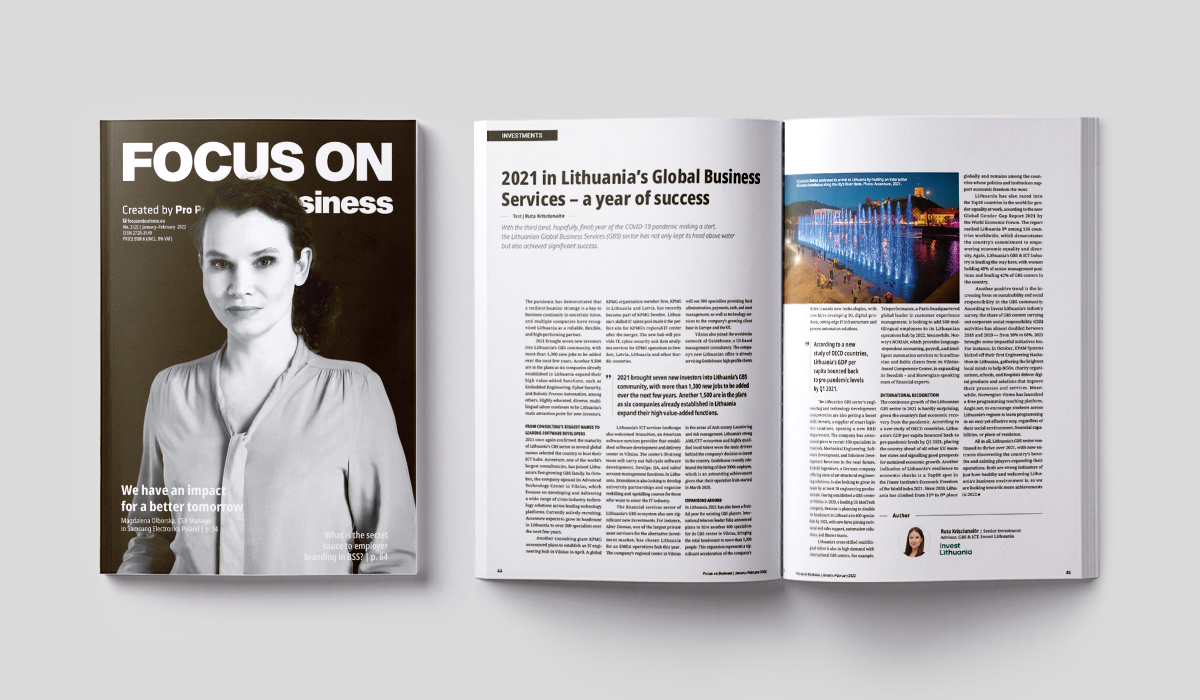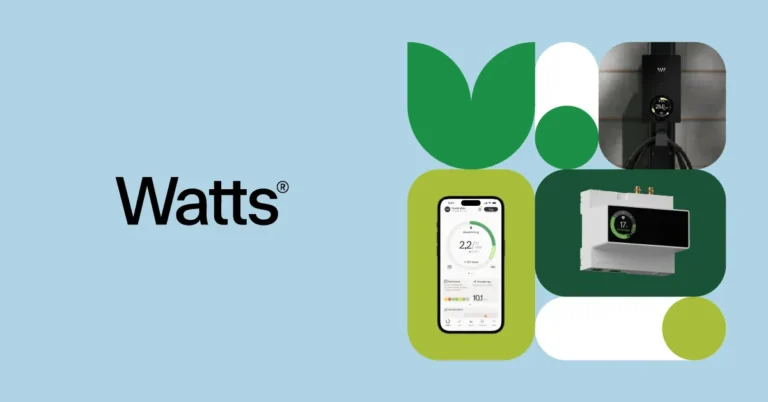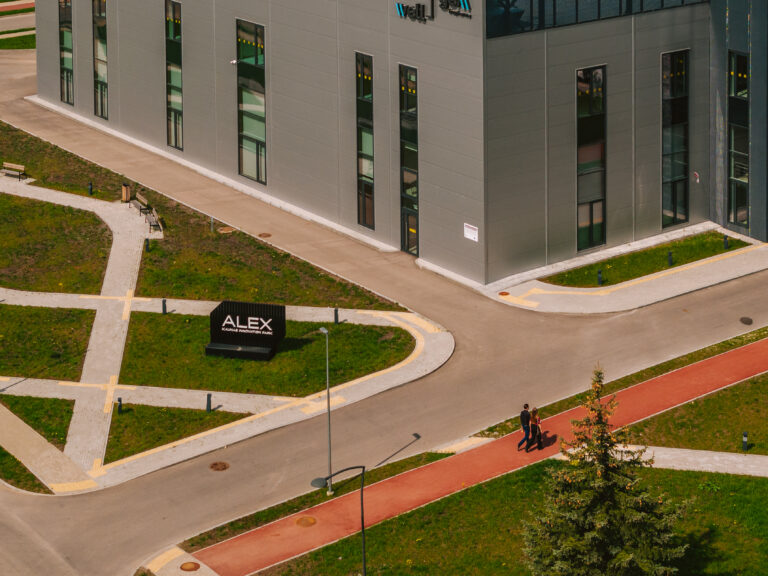The article has originally appeared in Focus On Business magazine.
With the third (and, hopefully, final) year of the COVID-19 pandemic making a start, the Lithuanian Global Business Services (GBS) sector has not only kept its head above water but also achieved significant success. The pandemic has demonstrated that a resilient location strategy is a key to business continuity in uncertain times, and multiple companies have recognised Lithuania as a reliable, flexible, and high-performing partner.
2021 brought seven new investors into Lithuania’s GBS community, with more than 1,300 new jobs to be added over the next few years. Another 1,500 are in the plans as six companies already established in Lithuania expand their high value-added functions, such as Embedded Engineering, Cyber Security, and Robotic Process Automation, among others. Highly educated, diverse, multilingual talent continues to be Lithuania’s main attraction point for new investors.
From consulting’s biggest names to leading software developers
2021 once again confirmed the maturity of Lithuania’s GBS sector as several global names selected the country to host their ICT hubs. Accenture, one of the world’s largest consultancies, has joined Lithuania’s fast-growing GBS family. In October, the company opened its Advanced Technology Center in Vilnius, which focuses on developing and delivering a wide range of cross-industry technology solutions across leading technology platforms. Currently actively recruiting, Accenture expects to grow its headcount in Lithuania to over 300 specialists over the next few years.
Another consulting giant KPMG announced plans to establish an IT engineering hub in Vilnius in April. A global KPMG organisation member firm, KPMG in Lithuania and Latvia, has recently become part of KPMG Sweden. Lithuania’s skilled IT talent pool made it the perfect site for KPMG’s regional IT center after the merger. The new hub will provide IT, cyber security and data analytics services for KPMG operations in Sweden, Latvia, Lithuania and other Nordic countries.
Lithuania’s ICT services landscape also welcomed Itransition, an American software services provider that established software development and delivery center in Vilnius. The center’s 30-strong team will carry out full-cycle software development, DevOps, QA, and sales/ account management functions. In Lithuania, Itransition is also looking to develop university partnerships and organise reskilling and upskilling courses for those who want to enter the IT industry.
The financial services sector of Lithuania’s GBS ecosystem also saw significant new investments. For instance, Alter Domus, one of the largest private asset servicers for the alternative investment market, has chosen Lithuania for an EMEA operations hub this year. The company’s regional center in Vilnius will see 300 specialists providing fund administration, payments, cash, and asset management, as well as technology services to the company’s growing client base in Europe and the US.
Vilnius also joined the worldwide network of Guidehouse, a US-based management consultancy. The company’s new Lithuanian office is already servicing Guidehouse high-profile clients in the areas of Anti-money Laundering and risk management. Lithuania’s strong AML/CFT ecosystem and highly-qualified local talent were the main drivers behind the company’s decision to invest in the country. Guidehouse recently celebrated the hiring of their 300th employee, which is an astounding achievement given that their operation kick-started in March 2020.
Expansions abound
In Lithuania, 2021 has also been a fruitful year for existing GBS players. International telecom leader Telia announced plans to hire another 400 specialists for its GBS center in Vilnius, bringing the total headcount to more than 1,300 people. This expansion represents a significant acceleration of the company’s drive towards new technologies, with new hires developing 5G, digital products, cutting-edge IT infrastructure and process automation solutions.
The Lithuanian GBS sector’s engineering and technology development competencies are also getting a boost with Dematic, a supplier of smart logistics solutions, opening a new R&D department. The company has announced plans to recruit 100 specialists in Controls, Mechanical Engineering, Software Development, and Solutions Development functions in the near future. Eisfeld Ingenieure, a German company offering state-of-art structural engineering solutions, is also looking to grow its team by at least 20 engineering professionals. Having established a GBS center in Vilnius in 2020, a leading US MedTech company, Dexcom is planning to double its headcount in Lithuania to 400 specialists by 2023, with new hires joining technical and sales support, automation solutions, and finance teams.
Lithuania’s cross-skilled multilingual talent is also in high demand with international GBS centers. For example, Teleperformance, a Paris-headquartered global leader in customer experience management, is looking to add 500 multilingual employees to its Lithuanian operations hub by 2022. Meanwhile, Norway’s NORIAN, which provides language-dependent accounting, payroll, and intelligent automation services to Scandinavian and Baltic clients from its Vilnius-based Competence Center, is expanding its Swedish- and Norwegian-speaking team of financial experts.
International recognition
The continuous growth of the Lithuanian GBS sector in 2021 is hardly surprising, given the country’s fast economic recovery from the pandemic. According to a new study of OECD countries, Lithuania’s GDP per capita bounced back to pre-pandemic levels by Q1 2021, placing the country ahead of all other EU member states and signalling good prospects for sustained economic growth. Another indication of Lithuania’s resilience to economic shocks is a Top10 spot in the Fraser Institute’s Economic Freedom of the World index 2021. Since 2020, Lithuania has climbed from 11th to 8th place globally and remains among the countries whose policies and institutions support economic freedom the most.
Lithuania has also raced into the Top10 countries in the world for gender equality at work, according to the new Global Gender Gap Report 2021 by the World Economic Forum. The report ranked Lithuania 8th among 156 countries worldwide, which demonstrates the country’s commitment to empowering economic equality and diversity. Again, Lithuania’s GBS & ICT industry is leading the way here, with women holding 48% of senior management positions and leading 42% of GBS centers in the country.
Another positive trend is the increasing focus on sustainability and social responsibility in the GBS community. According to Invest Lithuania’s industry survey, the share of GBS centers carrying out corporate social responsibility (CSR) activities has almost doubled between 2018 and 2020 — from 38% to 68%. 2021 brought some impactful initiatives too. For instance, in October, EPAM Systems kicked off their first Engineering Hackathon in Lithuania, gathering the brightest local minds to help NGOs, charity organisations, schools, and hospitals deliver digital products and solutions that improve their processes and services. Meanwhile, Norwegian Visma has launched a free programming teaching platform, Angis.net, to encourage students across Lithuania’s regions to learn programming in an easy yet effective way, regardless of their social environment, financial capabilities, or place of residence.
All in all, Lithuania’s GBS sector continued to thrive over 2021, with new entrants discovering the country’s benefits and existing players expanding their operations. Both are strong indicators of just how healthy and welcoming Lithuania’s business environment is, so we are looking towards more achievements in 2022.













